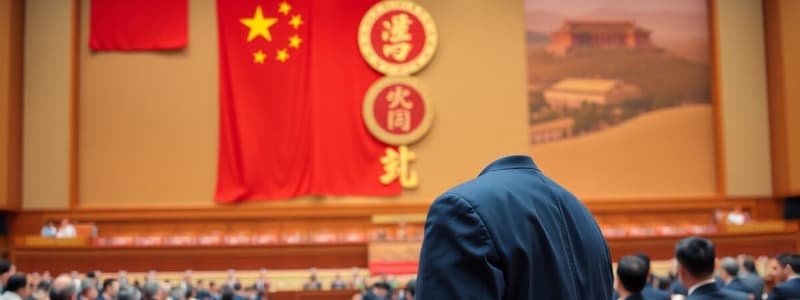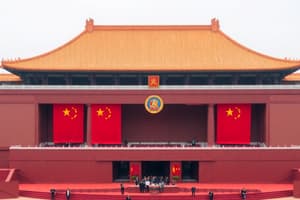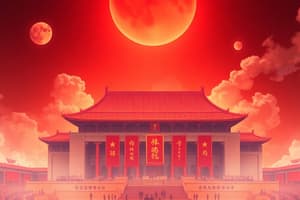Podcast
Questions and Answers
What is a principle of democratic centralism as practiced by the Communist Party of China?
What is a principle of democratic centralism as practiced by the Communist Party of China?
- The Party organization is subordinate to individual members.
- The majority is subordinate to the minority.
- Individual Party members are subordinate to the Party organization. (correct)
- All Party members are equal in decision-making.
Which of the following options best describes the Communist Party of China's leadership role?
Which of the following options best describes the Communist Party of China's leadership role?
- It is the founding political organization of the country.
- It functions solely as a consultancy group.
- It serves as the ruling party controlling state affairs. (correct)
- It operates without a Central Committee.
What are the long-term implications of extending the 9-year compulsory education to 12 years in mainland China?
What are the long-term implications of extending the 9-year compulsory education to 12 years in mainland China?
- It may support the development of higher education and industry. (correct)
- It will decrease the overall education level.
- It might reduce financial strain on families.
- It could lead to increased dropout rates.
Which of the following statements about the stakeholders’ views on data collection is accurate?
Which of the following statements about the stakeholders’ views on data collection is accurate?
Which organ is considered the highest authority in the state governance structure of China?
Which organ is considered the highest authority in the state governance structure of China?
What is a key feature of the education reform proposal mentioned for mainland China?
What is a key feature of the education reform proposal mentioned for mainland China?
Which of the following best describes the subordination principle of Party organizations under the Communist Party of China?
Which of the following best describes the subordination principle of Party organizations under the Communist Party of China?
What is one of the roles of the state organs for legal supervision in China?
What is one of the roles of the state organs for legal supervision in China?
What is the primary function of the National People's Congress (NPC)?
What is the primary function of the National People's Congress (NPC)?
How are deputies to the NPC primarily elected?
How are deputies to the NPC primarily elected?
Which group holds a significant number of seats in the NPC based on the member composition?
Which group holds a significant number of seats in the NPC based on the member composition?
What is one criticism highlighted regarding the NPC's ability to represent different social classes?
What is one criticism highlighted regarding the NPC's ability to represent different social classes?
What role does the Communist Party of China (CPC) play in the political system?
What role does the Communist Party of China (CPC) play in the political system?
Which organ plays a critical role in the supervision of government actions in the state?
Which organ plays a critical role in the supervision of government actions in the state?
What is the term length for deputies in the National People's Congress?
What is the term length for deputies in the National People's Congress?
Which aspect of the NPC has been emphasized to enhance harmony among different ethnic groups?
Which aspect of the NPC has been emphasized to enhance harmony among different ethnic groups?
What is NOT a responsibility of the State Council?
What is NOT a responsibility of the State Council?
Which body is responsible for supervising members of the Communist Party?
Which body is responsible for supervising members of the Communist Party?
Which statement best describes the status of the Communist Party of China?
Which statement best describes the status of the Communist Party of China?
What role does the National People's Congress play concerning Communist Party decisions?
What role does the National People's Congress play concerning Communist Party decisions?
Which of the following statements about the CPPCC is correct?
Which of the following statements about the CPPCC is correct?
Which of the following is NOT a function of the Political Bureau and its Standing Committee?
Which of the following is NOT a function of the Political Bureau and its Standing Committee?
The head of state in China also holds which of the following positions?
The head of state in China also holds which of the following positions?
What does the term 'two sessions' refer to in the Chinese political context?
What does the term 'two sessions' refer to in the Chinese political context?
Which of the following best describes the changes in power dynamics of the Communist Party before and after the Reform and Opening-up?
Which of the following best describes the changes in power dynamics of the Communist Party before and after the Reform and Opening-up?
What is one of the main channels for public supervision of the government in China?
What is one of the main channels for public supervision of the government in China?
Flashcards
Communist Party of China (CPC)
Communist Party of China (CPC)
The ruling political party in China, founded in 1921, with the largest membership globally.
Democratic Centralism
Democratic Centralism
A principle within the CPC where individuals are subordinate to the party organization, minorities to majorities, and lower organizations to higher ones.
Party Central Committee
Party Central Committee
The top decision-making body of the CPC, whose directives are implemented from top to bottom.
Subordination (in CPC)
Subordination (in CPC)
Signup and view all the flashcards
Highest organ of state power
Highest organ of state power
Signup and view all the flashcards
Highest organ of state administration
Highest organ of state administration
Signup and view all the flashcards
Indirect election
Indirect election
Signup and view all the flashcards
National Congress & Central Committee
National Congress & Central Committee
Signup and view all the flashcards
National People's Congress (NPC)
National People's Congress (NPC)
Signup and view all the flashcards
State Council
State Council
Signup and view all the flashcards
Central Committee (CPC)
Central Committee (CPC)
Signup and view all the flashcards
Political Bureau & Standing Committee (CPC)
Political Bureau & Standing Committee (CPC)
Signup and view all the flashcards
Central Commission for Discipline Inspection (CPC)
Central Commission for Discipline Inspection (CPC)
Signup and view all the flashcards
Chinese People's Political Consultative Conference (CPPCC)
Chinese People's Political Consultative Conference (CPPCC)
Signup and view all the flashcards
Channels for Public Supervision
Channels for Public Supervision
Signup and view all the flashcards
NPC Composition
NPC Composition
Signup and view all the flashcards
NPC Deputies
NPC Deputies
Signup and view all the flashcards
National Human Rights Action Plan
National Human Rights Action Plan
Signup and view all the flashcards
Reform and Opening-up
Reform and Opening-up
Signup and view all the flashcards
NPC Formation
NPC Formation
Signup and view all the flashcards
Ethnic Minority Representation in NPC
Ethnic Minority Representation in NPC
Signup and view all the flashcards
Representation Imbalance
Representation Imbalance
Signup and view all the flashcards
NPC Reflection of Public Interest
NPC Reflection of Public Interest
Signup and view all the flashcards
Study Notes
Chinese Political System
- The Chinese political system is a complex one, characterized by a unique form of governance.
- Key state organs include the National People's Congress (NPC), President, State Council, People's courts, and People's procuratorate. The leadership role of the Communist Party (CPC) is also crucial. The CPPCC is also a significant part of the political system.
- The NPC is the highest organ of state power, first convened in 1954. It holds national sessions annually. It's composed of 2980 deputies serving five-year terms.
Structure of the Central Authorities
- The NPC Standing Committee actively exercises the NPC's powers when the NPC isn't in session.
- The President is the nominal head of state and is elected by the NPC. Citizens of the PRC, who are 45 or older, are eligible to vote and run for office. There's no term limit for the President.
- The State Council is the executive body of the highest organ of state power (the NPC). The council is comprised of the Premier, and other state officials.
- The State Council has a 5-year term of office, and cannot serve more than two consecutive terms.
- The judicial system involves several levels of People's courts, overseen by the Supreme People's Court.
Functions and Powers of Main State Organs
- The NPC is responsible for amending the constitution and enforcing its implementation. The NPC also enacts and amends state laws.
- The NPC also elects and appoints, or removes members of state bodies and organizations.
- The NPC examines major state issues (including reports, plans, and the budget.)
People's Congress (NPC)
- The NPC is the highest organ of state power in China, convening annually after its initial meeting in 1954.
- 2980 deputies comprise the NPC, each with a five-year term.
- Representatives are elected from provinces, autonomous regions, municipalities, the military, and special administrative regions The election is based on population ratios.
National People's Congress (NPC) - Composition
- Representatives are elected from different regions.
- The number of deputies reflects the population of each region.
- The deputies to the NPC are generated by means of indirect election
National People's Congress (NPC) - Deputies
- There are 36 deputies from Hong Kong.
- Source 1 details the member composition percentages of the 12th and 13th NPC's, showcasing the proportion of workers/peasants, intellectuals, authorities, and other categories.
National People's Congress (NPC) - Functions and Powers
- Amend and enforce the constitution and enact/amend state laws.
- Elect, appoint, or remove members of state bodies/organizations
- Review major state issues, including reports, plans, and the budget.
- Supervise the State Council, Supreme People's Courts, and Supreme People's Procuratorates.
Leadership of the Communist Party (CPC)
- The CPC is the ruling party in China, having been founded in 1921. It is the largest political party in the world by membership numbers.
- Decisions flow from the top (Party Central Committee) to the grass roots.
Democratic Centralism
- In accordance with democratic centralism, all members and organisations within the CPC are subordinate to the National Congress and the Central Committee of the Party. Minority opinions are subordinate to the majority. Lower-level organizations are subordinate to higher-level ones.
Central Commission for Discipline Inspection (CCDI)
- The CCDI maintains the Party's constitution and discipline within the organization.
- The role includes overseeing Party organizations and members.
- Punishing party members who commit corruption and promotes anti-corruption work.
Chinese People's Political Consultative Conference (CPPCC)
- The CPPCC is a significant multi-party system that collaborates with the CPC.
- Its members come from various segments of Chinese society, including ethnic minorities, various political groups, and individuals without party affiliations.
CPPCC - functions
- Offers pre-decision consultation on general national/local principles and policies and important issues related to areas like politics, economy, culture, and society.
- Provides suggestions and criticism of state organ work, and participates in relevant inspections.
- The CPPCC puts forward proposals on state affairs through study reports or direct proposals to the CPC and state organs.
Supervision of the Government
- People's congresses supervise administrative, judicial, and prosecutorial organizations.
- The CPPCC offers suggestions for democratic supervision, which are responded to by the government.
- Social organizations, news media and surveys provide additional avenues for public input/supervision of the government.
- The petition system enables citizens to report grievances and encourage dispute resolution.
Self-Checking Questions
- Questions are posed (1-8) requesting information on aspects of the Chinese political system.
Vocab List
- A list of key terms/phrases related to the Chinese political system and its terminology is presented (1-17).
Studying That Suits You
Use AI to generate personalized quizzes and flashcards to suit your learning preferences.



